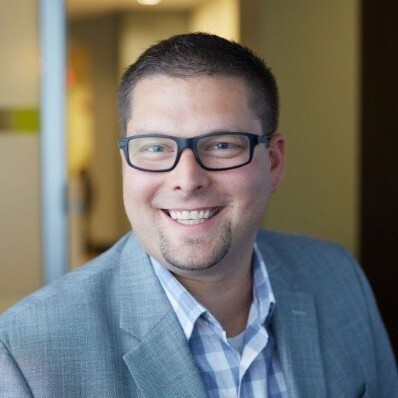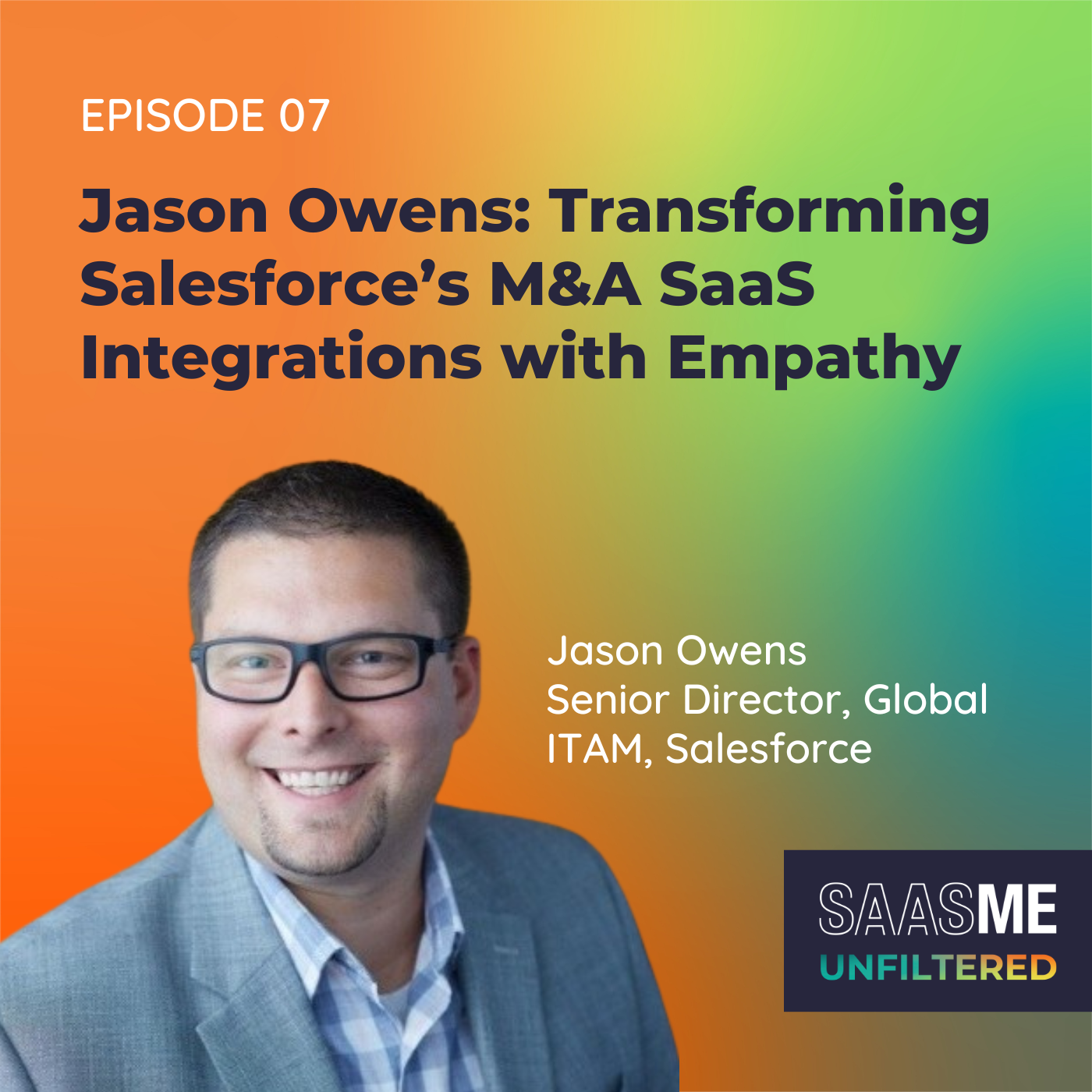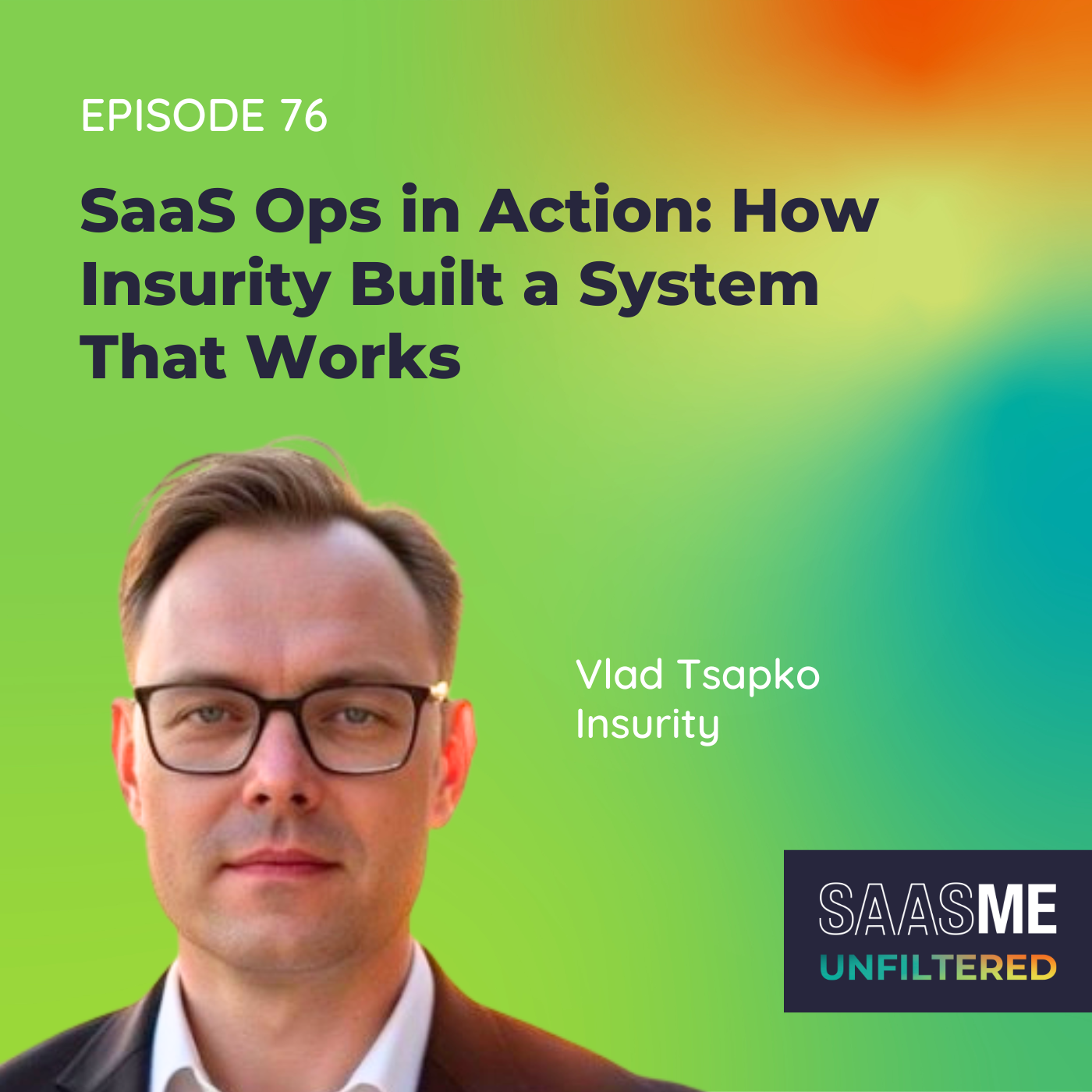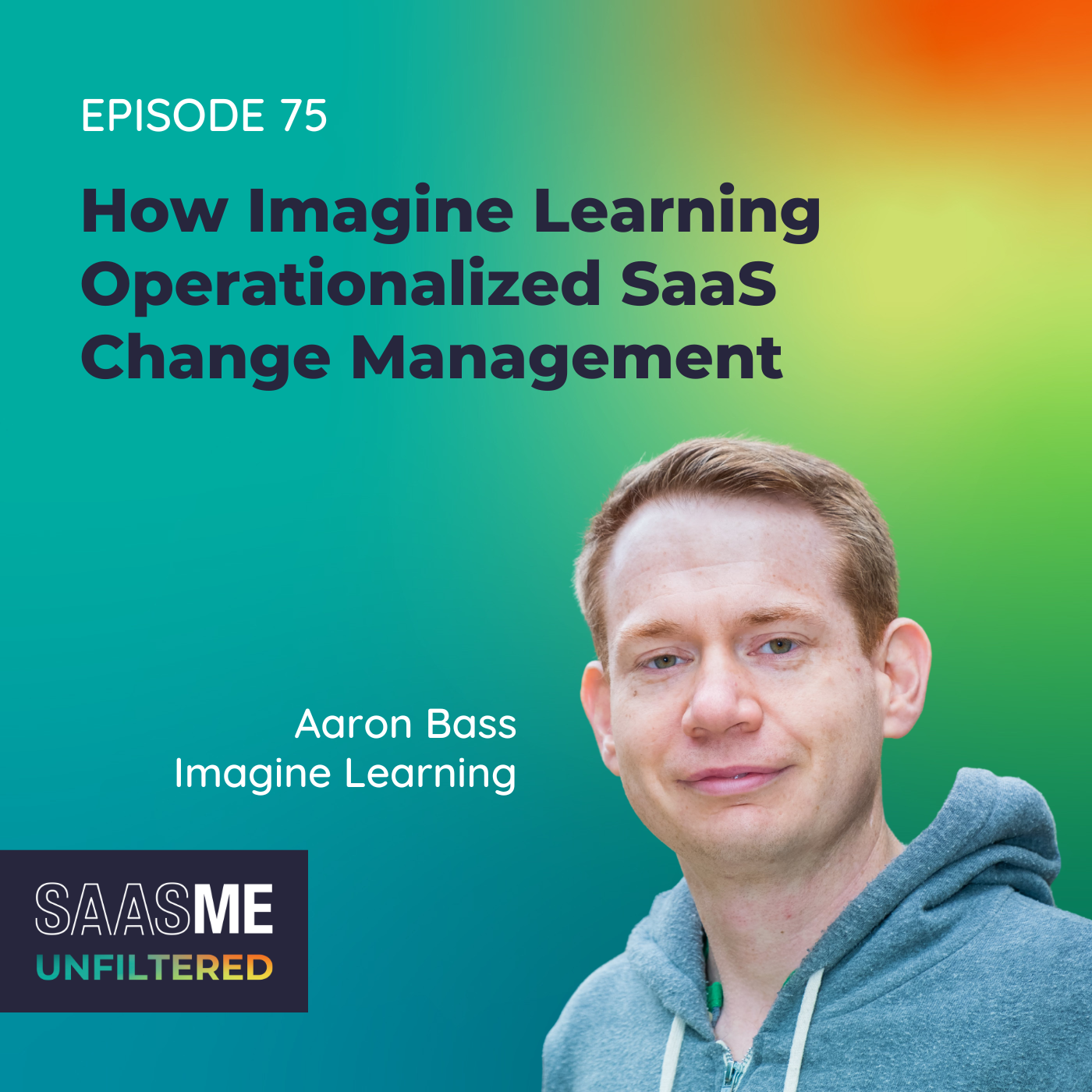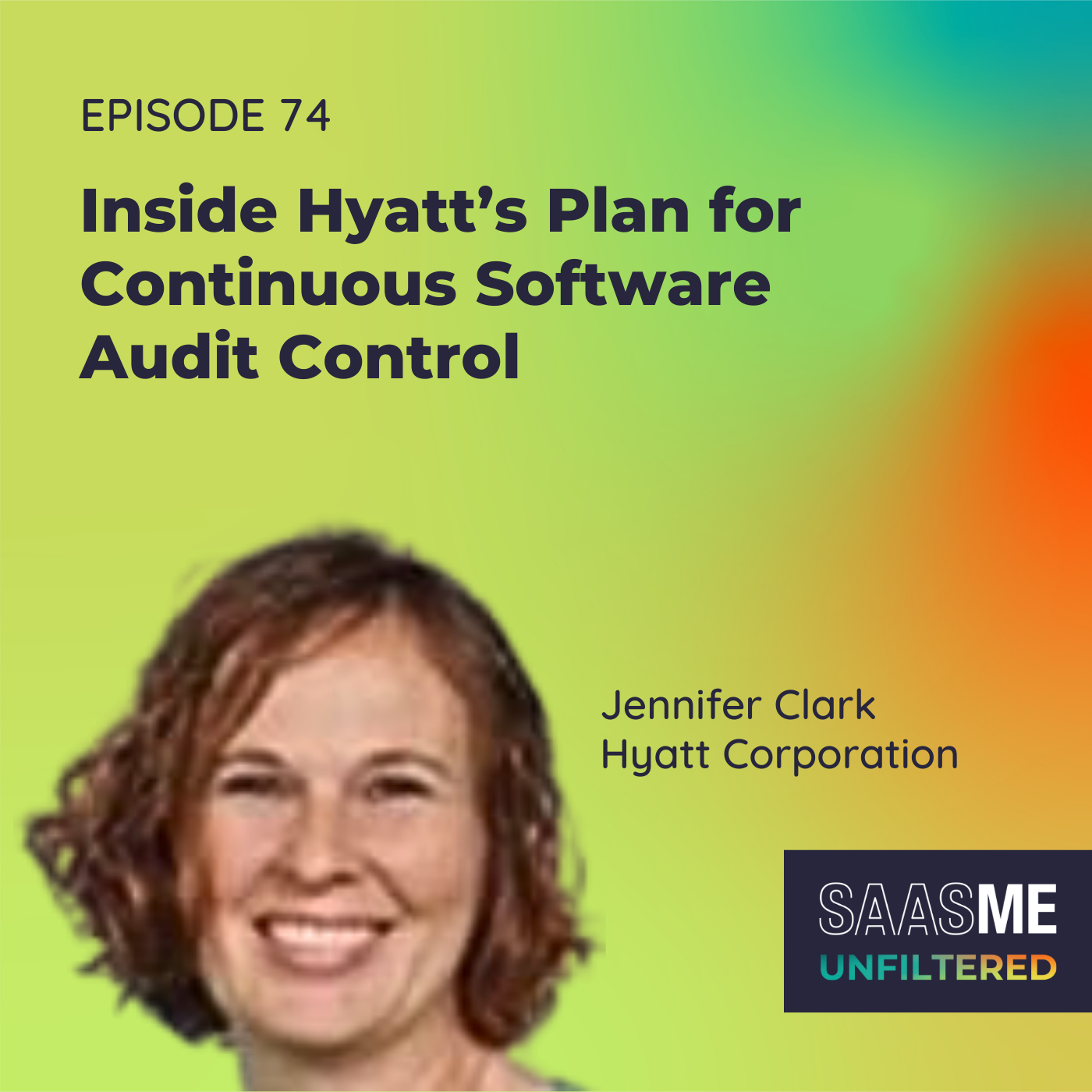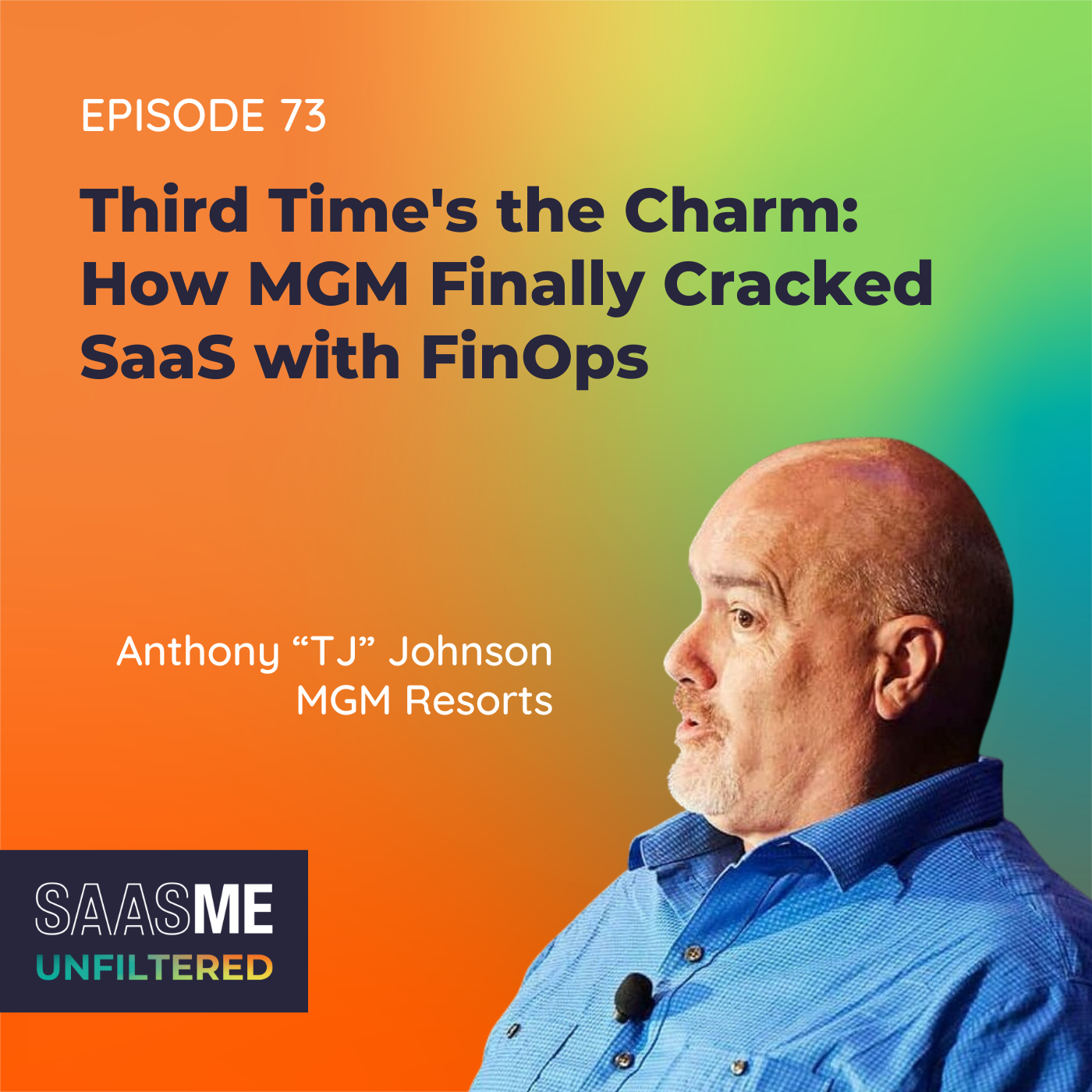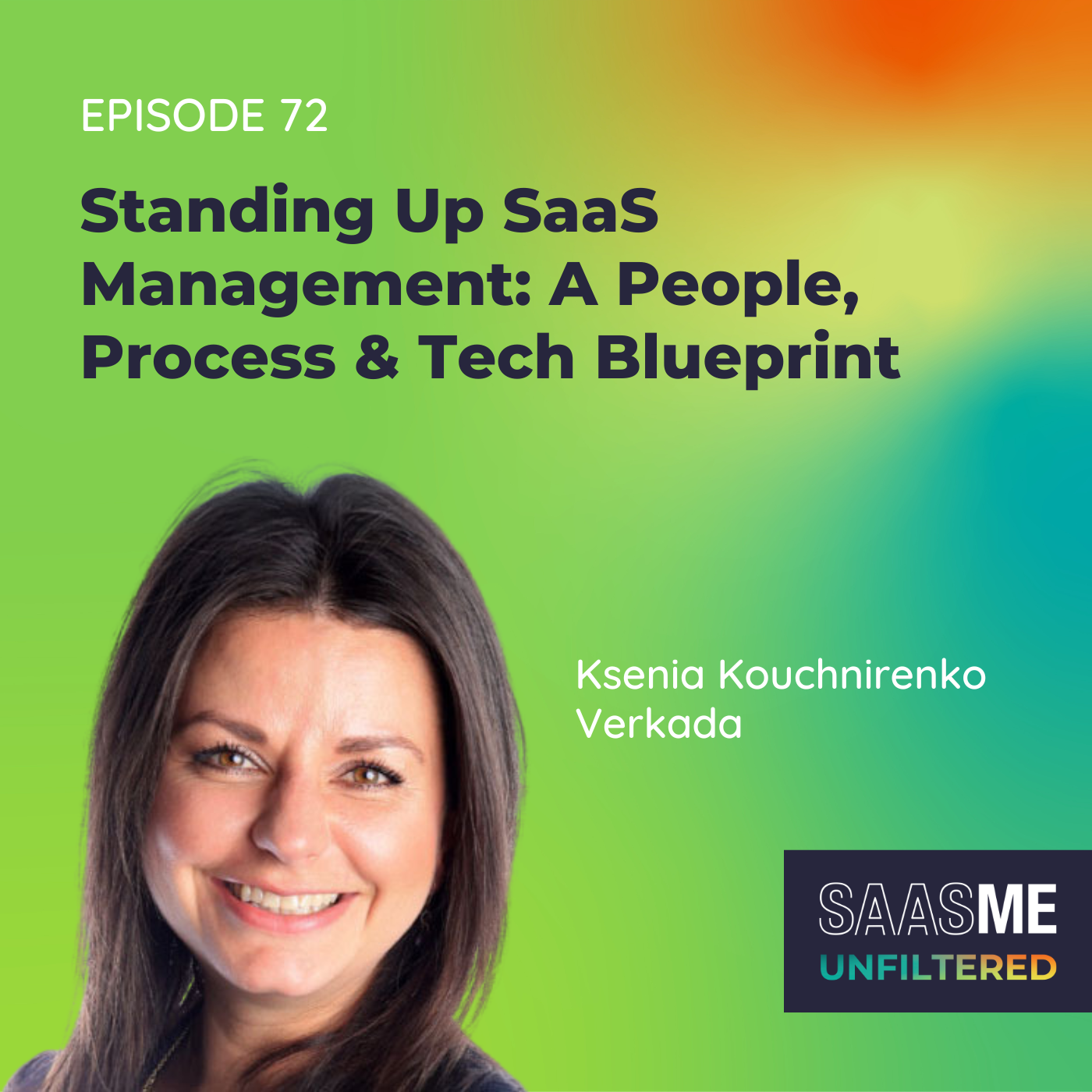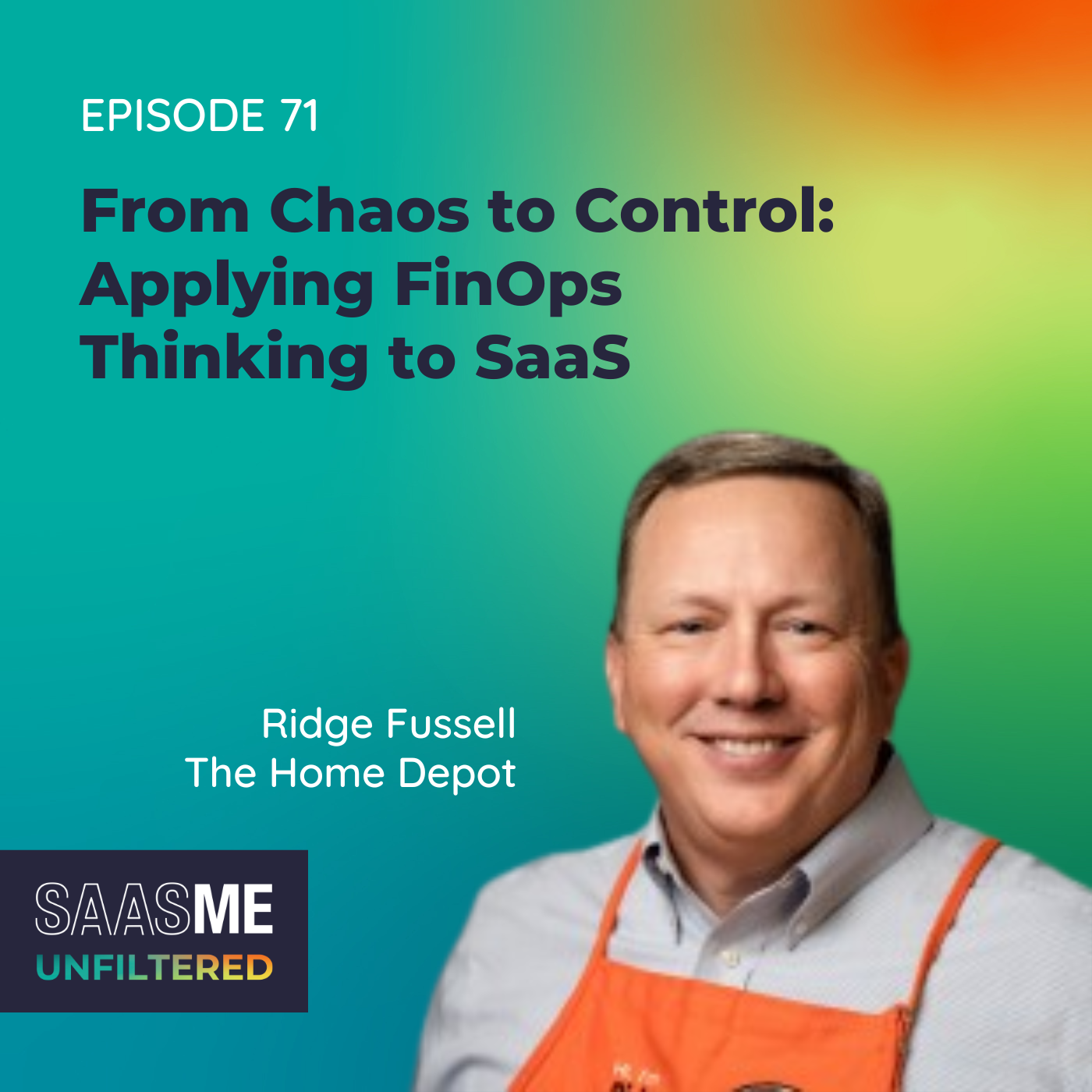Jason Owens (Part 2): Transforming Salesforce’s M&A SaaS Integrations with Empathy
- 0.5
- 1
- 1.25
- 1.5
- 1.75
- 2
Jason Owens: You really have to lead with empathy when it comes to M&A.
Cory Wheeler: Yeah.
Jason Owens: Because everybody's like," Okay, I'm working for this company. It's a great company." Everybody wants to go to work. Everybody wants to do well. And then all of a sudden," Oh no, what I thought I was doing for the next X number of years, my career journey, my plans, my healthcare, my everything is suddenly completely different," at the flick of a switch.
Cory Wheeler: Hello, hello, and welcome to SaasSMe Unfiltered, the SaaS management podcast, the show with give- it- to- you- straight, real life advice from pros, knee- deep in SaaS every single day. SaaS management superheroes, just like you.
Ashley Hickman: Welcome to another episode of SaaSMe Unfiltered with your two favorite co- hosts, me, Ashley Hickman, and Cory Wheeler. Today we are back with our friend and global SAM leader, Jason Owens from Salesforce. So first and foremost, Jason, we're so excited to have you join us again. This is actually a two- part episode, so in the last episode we covered how software asset management helps unlock value and drive transformation within the business. Today we're going to be learning a little bit more, digging in. You have a fairly mature process, Jason, around your business technology apps. If we consider the growth of SAM, especially in the SaaS space, and there are a lot of apps in use at Salesforce today, I want to dig in a little bit. How do you define the business technology strategy? What does that look like for everything that lives outside of biz tech? Or are you hands- off completely with those applications?
Jason Owens: One of the things, we have a new CIO, and I'm sure you're aware of Juan Perez has joined from UPS. And we've had some really outstanding conversations internally as a business technology organization of what does it mean, what does citizen managed application development or application use look like? I think there's a shift in the industry to move away from calling that shadow IT, and to look at the democratization of applications and application access and say," Hey, if it doesn't meet a criteria that we set to be an enterprise application, an enterprise manage application, then we want to help teach you how to properly manage it so that it's secure and performant." And you're not going to cause an outage or an issue or have data loss. And I think that's where Joe Ryder and I had this awesome brainstorm session almost three years ago where we talked about," Hey, we're never..." Just talking brass tax again," We're never going to get the funding to have a true AMIA style governance and compliance software asset management program that manages every application, inception to deprecation across the entire enterprise." That's never going to happen. However, knowing that we're not going to be there, what can we do to influence other business units to say," Hey, you have these applications in your environment. What if we taught you or helped you standardize, centralize your contracts, realize cost savings, and then stand up an application management or an application operations team within your line of business that's going to drive cost savings, discrete cost savings, to your bottom line in the line of business."
Cory Wheeler: Sure.
Jason Owens: We called it at the time jokingly a cohort of software asset management teams. And it's crazy that stuff you just throw on a whiteboard a couple years is coming to fruition, because we now have two lines of business where they've come to us and said," Hey, we see you're doing this." And we're like... The first thing they ask is," Can you just do everything for us?" I said, well, if you give me the headcount, I can. 100%, full stop, I'll do it for you." But they're like," Yeah, we can't do that. It's hard to get headcount." I'm like," Cool, so we'll teach you." And so we have, through sales operations with some of our TMP friends, we have been able to help them stand up teams that are in effect software asset management teams, managing license distribution governance and basically the life cycle of their line of business applications that wouldn't meet that threshold, the rise to an enterprise managed application. And what it does is that it... Rising tide lifts all boats, but everybody starts to get a little more aware of what the software asset management portfolio and perspective and value drivers are. And as soon as somebody sees a six or seven figure cost savings, they're like," Oh, let's do more of that. Let's tell other people about that," and so suddenly you have... Even if it's not acknowledged as pure software asset management, it is an increased governance of particularly SaaS software applications that is driving a reinvestment value into our business.
Cory Wheeler: Yeah. I think that's much more progressive than you probably give yourself credit for. It's pretty awesome.
Jason Owens: It's funny you say that because we go to industry conferences and we're like," Oh man, it's so terrible. We have all these fires, we can't..." And somebody looks at me and goes," Your CIO actually talks about asset management?" Or," You have VPs that even know what software asset management is?" They're like," Man, I wish somebody would talk about software asset manage." And I'm like," Oh." You kind of forget that there are... Just by being fortunate enough to be at Salesforce that we're in that upper quartile.
Cory Wheeler: Very much.
Jason Owens: And we just lose sight of that sometimes.
Cory Wheeler: Yeah, I think it's historically... Software asset management as a practice, and I think I can speak from this because I formerly was in procurement, which is very similar. But it's really measured, historically, has been measured on risk mitigation of fear of audits.
Jason Owens: Right.
Cory Wheeler: Almost like a transactional org that they're going to go fight against those audits. And they're going to do license positions and get us out of an invoice that's a seven- figure invoice, that just happened to land on our desk because we inaudible.
Jason Owens: We do some of that.
Cory Wheeler: Sure, sure.
Jason Owens: And we do it really well, but that's not what our true value of the organization is.
Cory Wheeler: Right. So let me ask this, as you think about your true value of your organization, I've heard cost savings. I've heard generating ROI to be a self- funded organization, but it's not just that. What are those KPIs that you measure your organization by? And even maybe backing up from that just a half beat is, what are the big rocks, what are the goals of your program at the highest level?
Jason Owens: It's funny you mentioned the big rocks, because both Juan and Andy have used a phrase lately that has kind of struck a chord with my team and I, it's a low tide reveals the stones, or reveals the rocks. Like in good times, when you have the high tide and the water's high," All right, we're not going to run aground on any of this stuff." But when the tide is lower and you get into a little tougher time, it's like," What are those big rocks? Okay, what is it that we..." If we go a year out and we look back at today and say," Man, I wish I had done that thing a year ago today because now I have to do it, what are those things?" And so from a KPI perspective, we really show our value through cost avoidance and cost savings, as well as we track reinvestment or cost avoidance through software reclaims. We track that on a granular per- seat level. But we're really, and this is where I don't have a good metric today, and we're talking through on the team like," How do we track that... What is that next generation KPI that shows the value to the C- suite, but is also easily understood by those in and outside of SAM?" And I don't have a good answer today, but I want to figure out what one is. I do know that, personally, one of the things I'm most proud of is not the dollars we've saved. It's not defending an audit or fighting off an invoice. It's the fact that three people from our program are now at other awesome companies, leading their own SAM programs or portions of a SAM program. And to me, that is proof in the pudding. If you want a key metric, it's that our leaders from our SAM program are going elsewhere in the industry and making a huge difference for the companies at which they go to. That's a proof in the pudding KPI for me, it's that people are going and really delivering and unlocking value across multiple industries.
Cory Wheeler: Yeah, super cool. And I know those folks that you're talking about and they've been amazing to work with. I want to ask a question around M& A, mergers and acquisitions. Salesforce is incredibly acquisitive. I had the good fortune of going through an acquisition, being part of an acquisition by Salesforce as well. And software as a service really comes into focus during M& A activities. And maybe talk a little bit about that, but what is the importance of managing M& A? And this is really how we first started working together and engaging with Salesforce, was around that specific use case.
Jason Owens: Totally.
Cory Wheeler: How does Salesforce handle M& A today in your world, around software? Is there a dedicated function? Maybe talk a little bit about M& A at Salesforce today because it's massive.
Jason Owens: Yeah, it is. It's massive. Last I saw, and I actually quit counting, but a couple years ago at some point Salesforce had acquired 83 or 86 discrete entities and that was pre Slack. So it's only higher than that now. It's part of our business motion. And I don't mean that just from Salesforce as a business, in leaders talking at investor relations events. I mean that we have to, as part of our day- to- day jobs, consider M& A activity. Yes, we have a discreet M& A function, most of the lines of businesses do. But in SAM, because of the nature of how do we integrate both the contracts, directly working with the sourcing partners, but also all of the vagaries of working through SaaS account integration, we have dedicate... Like I said, Martin Brophy on my team is dedicated to both onboarding and M&A, and we name M& A as a function within our space and say," Look, this is a thing. Salesforce is never going to just stop acquiring companies." So we can't bury our head in the sand, we have to deliver processes and we have to deliver procedure. And we have to integrate with the BT M& A organization to deliver and set up ease of integration for our acquired team members. And one of the things that we have to lead with in that space is empathy. M& A is incredibly difficult for the people who are acquired. And I did not join ExactTarget, I was hired by Salesforce right after that acquisition, but I came into this space where everyone that I worked with was part of the acquisition. And then I had the good fortune to move to Boston for a couple of years and help with the Demandware integration, before moving back and taking this role in Indianapolis. And you really have to lead with empathy when it comes to M&A. Because everybody's like," Okay, I'm working for this company. It's a great company." Everybody wants to go to work. Everybody wants to do well. And then all of a sudden," Oh no, what I thought I was doing for the next X number of years, my career journey, my plans, my healthcare, my everything is suddenly completely different," at the flick of a switch, at the end of a business day when it gets reported to the street. And so it's really difficult when you say," Okay, we have these standards. Guess what? You have to move to these standards." And so we have our team, Martin and Chris, and they're really skilled at having those conversations saying," Hey, I know that you really like this tool, you want to keep using it. And we'll help you get over to whatever the new platform is." And in some cases, particularly companies that are cloud native, they have a lot of the same tools in use. And so that makes ease of transition a little bit easier because they're just, it's all about org integration at that point. And we've actually seen some tools that were heavily in use at some acquisitions where we said," Ooh, this is actually really good, they have good terms. What does that look like for our standardization internally?" And we've pivoted to tools that were heavily in use at acquisitions because of the fact that it was advantageous to the business. It just comes down to being empathetic and being mindful. And knowing that everybody wants to do a good job. Nobody gets up, comes to work and says," I'm going to be terrible today." I mean, maybe some people do, but they're not going to be there very long.
Cory Wheeler: Yeah. Yes, yes.
Jason Owens: But for the most part, everybody's just trying to do their job. And that is, for me, the key takeaway in M& A is empathy. We can figure out all the commercials, all the terms, all the seeds, all that stuff, we do that anyway. But bringing empathy to the table in M& A, that's where we really drive... When we've had really good integrations and really good journeys for companies that have been acquired for folding them into the portfolios, because we started with empathy.
Ashley Hickman: Are you blown away by the amazing work our SaaSMe Unfiltered guests are doing? Now you can join them at SaaSMe, the industry's only SaaS management event. Hear from the experts, discover trends, and learn from the pros knee- deep in this shit every single day. Register today at saasme. com, that's S-A- A- S- M- E. com.
Cory Wheeler: How do you balance empathy with speed? You've got to be delivering on tight timeframes. You've got renewals that you've got a co- term. You've got orgs that you've got to bring together. Everybody is under a deadline, so how do you balance the two?
Jason Owens: Really that just comes down to prioritization. We work with the M& A team. We take the Zylo data, we comb through credit card and finance, and we figure out, all right, what are the contract dates? And then we basically take a matrix view of contract dates out into the future, plus spend, plus the... There's a third thing there. It's not just how much you're spending on the platform, but what is the lift and the effort to transition that, either to the correlated business platform at Salesforce, or to retrain individuals to move them over to a new platform. And sometimes it's not cost effective to do that integration in the first year and we say," All right, we're going to set a roadmap target for the second renewal that we want to move over." And again, I'll say, this is something that we continue to improve on and we are iterating on and we get better with every deal. And Ashley Brown and Sam Wingo and Leslye Kellner over at M&A have been great partners. And we use that Zylo data to help drive that roadmap, and it's not the same every time. It's like, we have playbooks, but our playbooks have to be super flexible just because not every M& A is the same, first from a size perspective, line of business, what they do, there's all these just stuff that you have to figure out. And it's one of those things that's as much art as it is science. Because it's not just what are the contract terms and dates, but it's like, what does this look like from an effort and initiative perspective to get this stuff across the line.
Ashley Hickman: That's really helpful insight, Jason. Especially around M&A, like the need for empathy, but of course balancing that with prioritization. What is the one thing for people who are either beginning your journey? Today a big proponent of people entering in the software asset management space, which I love. What is one thing for SaaS managers, for people who are in this space, new to this space, what is the one thing that you would recommend people maybe stop or start doing?
Jason Owens: I think the number one thing that every software asset manager should start doing is talking to the people that are using your software. And I don't just mean the person at the top of the rec who signs off on it, but go and understand who's using the software. Why are they using it? What value does it drive for them? And then how can you use that insight and that conversation, that relationship that you build with them, to drive better value across the rest of your portfolio. That has done wonders for our team, where we said, "All right, somebody's coming to us and asking for this title. What's going on here?" Let's dig into this a little bit more and say," Hey, can I sit in on one of your calls and understand how you're using this tool?" And then say," Oh wow, they're using it in a way that doesn't even really meet the Capterra definition of that tool. So that's why we didn't understand why they wanted to use it for that way." And standardize on some tools that just kind of bubbled up to us in that way. And being open to listening to customers when they have some new tool or new software, new title, that they say," Hey, this is driving value for us and here's why," rather than being the wall of no and saying," No, it doesn't meet our stuff." It's really that tension between standardization and innovation that you have to find a happy medium on. And I think software asset managers that do that will have unlimited career horizons as we go forward in the next 20 years.
Ashley Hickman: I love that. Going back to, just talk to people.
Jason Owens: Right.
Ashley Hickman: Find out... Yeah.
Cory Wheeler: Just talk to people.
Ashley Hickman: Yeah, have a conversation. But yeah, it really does go down to use case requirements and just understanding, having those conversations. And that's ultimately going to lead, to your point, the customers, your team members that you're serving. Making them the most successful that they need to be, as well as your team long- term.
Jason Owens: Totally.
Cory Wheeler: Well, I think it's time to start to wind down. But before we do that, I want to close this out in a very familiar way. We love to do a little bit of rapid fire at the end of every one of our episodes. So Jason, you are now officially on the hot seat.
Jason Owens: Awesome, let's go.
Cory Wheeler: We're going to ask just a few questions. You give us your off the cuff response, one word, a sentence, whatever you want to do, but would love to get your thoughts. Ready?
Jason Owens: Cool.
Cory Wheeler: All right. What is your best or favorite Indy 500 memory?
Jason Owens: The number one best, it wasn't sitting in turn three, watching Alexander Rossi go by, out of gas, which was pretty cool. It was the year Simon Pagenaud won, and it was my son's first Indy 500. And every year we get the newspaper and we cut it up and everybody gets five bucks and pulls a driver, and he pulled Pagenaud. And to see him root and realize that his driver won, and he's hooked on IndyCar since that day. To know that that little like," Okay, we're just..." The little traditions that everybody has around the 500 and then that just cemented for him... He still talks about it to this day. He's got Pagenaud Diecast, and he's like," Dad, remember?" Anytime we see him, he's like," Dad, remember?"
Cory Wheeler: Oh.
Jason Owens: inaudible," I remember."
Ashley Hickman: Next up, your bucket list vacation spot for yourself, for your family.
Jason Owens: I think our bucket list family vacation spot is in Northern Georgia, the Clayton area.
Ashley Hickman: Oh, yeah.
Jason Owens: We went there for the first time last year and absolutely loved it. Particularly on fall break, it was great. We're looking to try and go back again soon as a family trip. For personal, my bucket list vacation is to do the 24 Hours of Le Mans. We've talked about that. We're in the early stages of planning to make it next year, which will be the 100th anniversary of the first Le Mans, which will be pretty coo.l and try and make it into a kind of... Because bucket list for my wife and I is anywhere in Italy. And so we're going to try and do a two week European vacation where we start in London and do the Chunnel and then do Le Mans, and then finish up through Switzerland and Northern Italy. So we're really looking forward to that.
Cory Wheeler: Trip of a lifetime. Okay. I'm going to have to help you here, because I think I know the answer to your question. But I'd love to know, work and personal again, your favorite SaaS application. And Zylo, you're not allowed to say Zylo, I'm going to take that away from you because I know that's where it was going. So outside of that, your favorite work and personal SaaS apps?
Jason Owens: My favorite work SaaS app, and this is not the hometown cooking, is Slack.
Cory Wheeler: Sure.
Jason Owens: It really has been transformative for how we've run our business. Having a team that runs 24 by five, Follow the Sun, and we have a app... We have little widgets set up in our channels that everybody can do a standup, check in every day so everybody knows what everybody's working on. And we don't have to have face- to- face," Oh, let's all hop on a call," but somebody it's 7:00 PM and somebody it's 5: 00 AM. No, we can have that Follow the Sun information exchange in a way that's really conducive to everybody, still maintaining barriers and boundaries between their personal life and their work. Because at the end of the day, works great. I love coming to work, but I love my family more. And so that's what it's about. So that's from a work perspective, that's inaudible about. Man, that's a really tough one. For a personal-
Cory Wheeler: I mean, it could be an app on your phone, really anything.
Jason Owens: It's not SaaS, so I can't say iRacing because it's installed locally on your computer, so that doesn't really count. I'm probably going to go with Discord, for again, getting back to... One of my hobbies is iRacing, I used to... Before I had a son, I raced go- karts as a hobby.
Cory Wheeler: Ooh, inaudible.
Jason Owens: It's a little more frowned upon to race when you have a kid, and my wife didn't love it when I did it anyway. I love being able to be home and racing and I've built some great friendships over Discord with fellow iRacers.
Cory Wheeler: Sure.
Jason Owens: And so much so that we had a 25- person get- together at the Indy 500 this year of people that had never met before in person. And we just all met at the race around a shared passion, which was really cool.
Cory Wheeler: That is.
Jason Owens: So I'll go with Discord.
Ashley Hickman: Nice, awesome. And top five things that you're listening to or reading or people should check out, any reps?
Jason Owens: Two things that are top of mind for me, for Father's Day last week, and had this awesome opportunity with my brothers and our dad down to Cincinnati to a Steely Dan concert, because that's my dad's favorite band.
Ashley Hickman: Nice. Very nice.
Jason Owens: We had the chance to go do that, which was really cool. So I'm kind of stuck on a Pandora, Steely Dan playlist right now. From a vinyl, I'm a big vinyl guy, I've got my record player right there over my left shoulder and tend to track an album or two every day. Right now the album that I can't stop playing, I play it a couple times a week, is Tedeschi Trucks and Trey Anastasio. Revisited the Layla album from Derek and the Dominos, and basically did front to back, it's three LPs, it's absolutely fantastic. And I highly recommend it if you are either a Clapton, Derek and Dominos, Allman Brothers, or even a Tedeschi Trucks fan. So that's where I'm at from a musical perspective. I'm kind of stuck on my books right now, I'm in the middle of... I tend to really enjoy World War II Naval history. And I'm in the middle of the second book of a three volume series of the Pacific Naval War. That's really good, by Ian Toll.
Ashley Hickman: Oh, yeah.
Jason Owens: So if you like Naval history, check that out. And other than that, it's that plus IndyCar racing and F1 on TV and that's the extent of my media. Oh, I'll add one more. We just finished up Obi- Wan, my son and I, and it was fantastic. No spoilers, but the last episode was great.
Ashley Hickman: Awesome.
Cory Wheeler: All right, I'll put that on the list. But Jason, listen, it's been a pleasure talking with you today. What I take away from our conversation, your passion around SAM is infectious. The way that you set up your program is very progressive. You've got a very mature strategy in mind to organize such a global organization, 75, 000 person company. What you're doing is on the leading edge of software asset management in the industry. And we work with a lot of software asset management leaders. So kudos to you for being a transformative and progressive leader in such a progressive company. Thank you so much for being on the podcast today.
Jason Owens: Thanks, it was great. I would be remiss if I didn't give all the credit to my amazing software asset management team around the world. They're the ones that do the work. I just ask a lot of questions. Without them, I wouldn't be here talking to you.
Cory Wheeler: Did you enjoy the episode? Pass it along to your friends. Subscribe to get notifications for the latest episode. Share your favorite takeaways and join the conversation on social media using# SaaSMeUnfiltered.
DESCRIPTION
Mergers and acquisitions are a strategic decision that can deliver great benefits to your business. However, it can be completely disruptive for new employees. At Salesforce, Jason Owens and his software asset management team transform the M&A process by practicing empathy. In this episode, discover how Salesforce approaches SaaS software integrations and evangelizes the SAM practice across the organization.
Episode Highlights:
- [01:19] Discussing Jason's mature process for defining business strategy and the growth of SAM
- [06:19] What are the Big Rocks?
- [08:50] Mergers & Acquisitions of SaaS companies
- [14:03] Balancing empathy with speed
- [16:00] A recommendation to start or stop doing for those in SaaS
- [18:24] Rapid Fire and all about the Indy 500
Today's Host
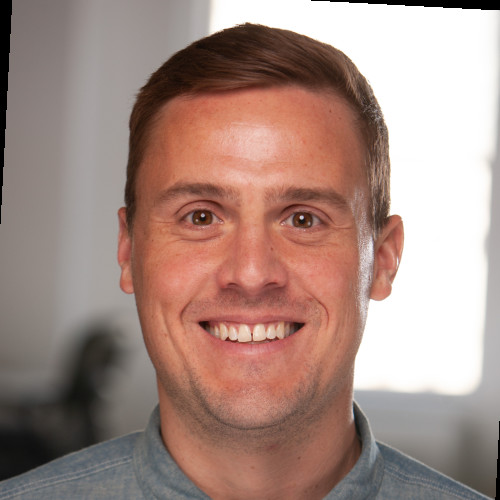
Ben Pippenger
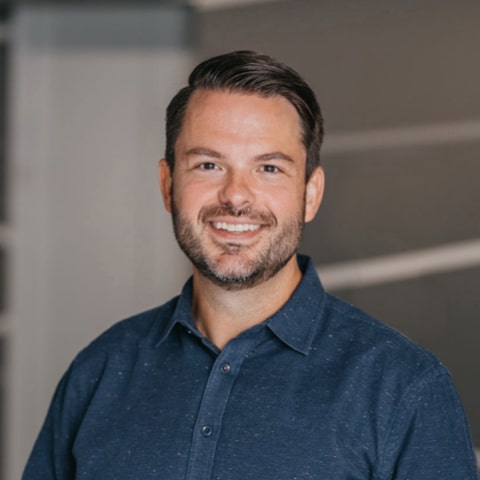
Cory Wheeler
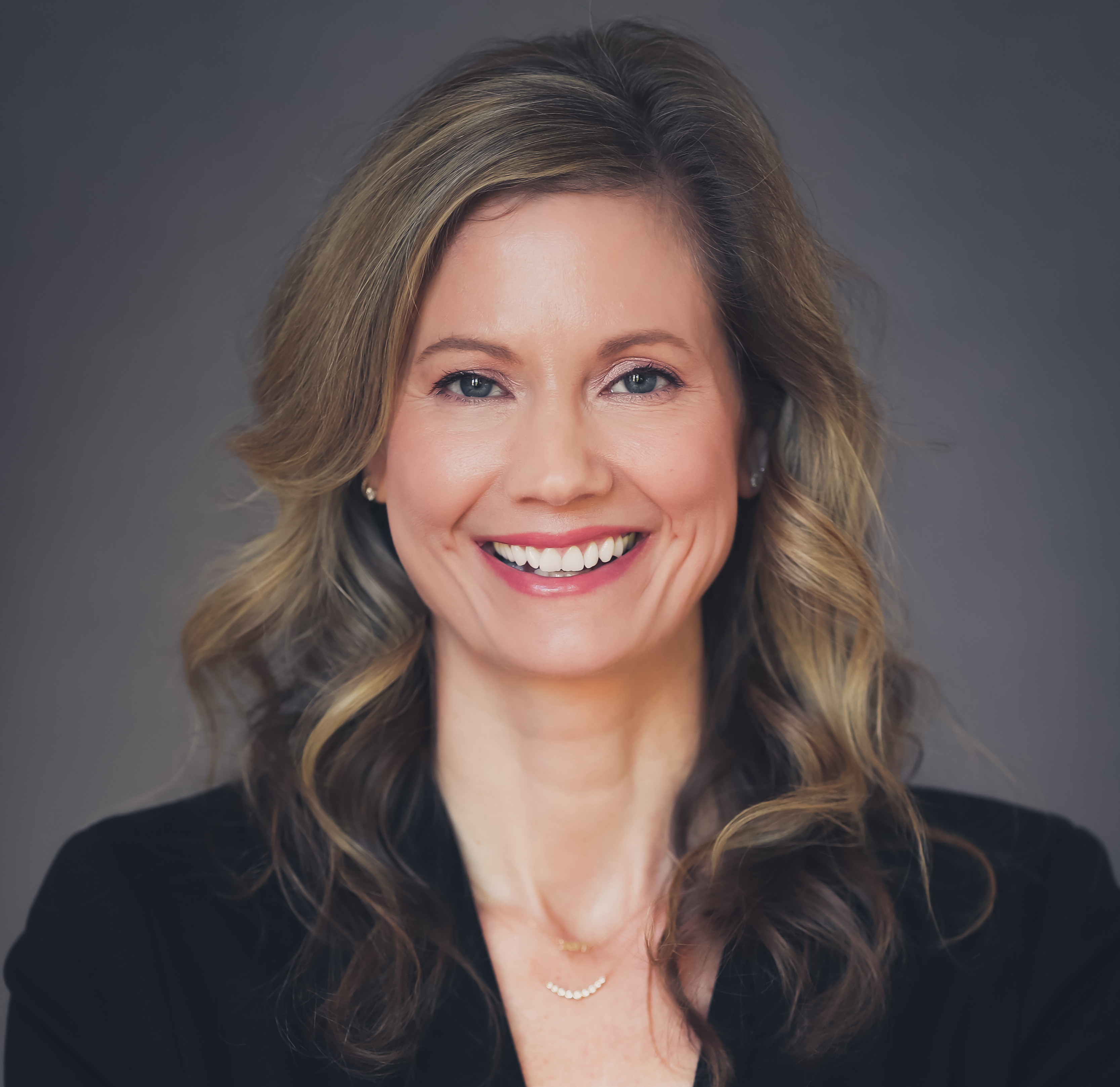
Meredith Albertson
Today's Guests
